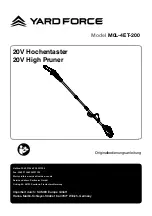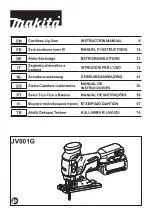
ENGLISH
EN
35
Provide adequate lighting or good lighting condi-
tions when working with the machine.
Do not work with electric tools in conditions with
flammable liquids, gases or dust. Electric tools
produce sparks able to ignite dust or fumes.
Protect yourself from electric shock.
Avoid body contact with earthed objects (for example
pipes, radiators, electric stoves and cooling units). There
is an increased risk of electric shock if your body is
earthed.
Keep children and bystanders away while ope-
rating a power tool.
Do not touch the electric tool
or the cable. When not concentrated, you may lose
control over the machine.
Ensure that you store electric tools in a safe place.
Tools which are not in used must be stored in a dry
place as high as possible out of the reach of children
or in an inaccessible place.
Do not overload the machine. Use appropriate
electric tools for your work. Working with approp-
riate electric tools is better and safer when within
the specified power range.
Do not use low-power
machines for heavy work.
Do not use the electric tool for purposes for which
it is not designed.
For example, do not use a manual
circular saw for cutting branches or logs.
Dress properly. Do not wear loose clothing or jewel-
lery. Keep your hair, clothing and gloves away from
moving parts. We recommend that you wear non-slip
shoes when working outdoors. Wear a hairnet if you
have long hair.
Use protective equipment which fit you.
Wear
safety goggles and ear protection at all times. A dust
mask or respirator is also required. Wear tight-fitting
gloves at all times when handling sharp blades and
saw blades,
If dust exhausters and catchers are to be installed,
make sure they are fitted and used properly.
Using
a dust exhauster may reduce the exposure to dust.
Do not use the cable in conflict with its designa-
tion, to carry or hang electric tools or to pull the
plug out of socket. Protect the cable against high
temperatures, oil, sharp edges or moving parts of
the machine.
Damaged or entangled cables increase
the risk of electric shock.
Avoid any abnormal body posture. Provide good
stability and keep balance at all times.
By this,
electric tools are better controlled in unexpected
situations.
Treat electric tools carefully. Check whether the
moving parts work perfectly and do not drag,
whether not broken or damaged to such an extent
that functioning of electric tools could be affected.
Have any damaged parts repaired before using the
machine. Poor maintenance of electric tools is a
cause of many injuries.
Keep the cutting tools sharp and clean.
Carefully
treated cutting tools with sharp edges get stuck less
often and are easier to guide.
Follow the instructions for lubricating and chan-
ging tools.
Check the connection cable on the electric tool at
regular intervals and have it replaced by an expert
if it is damaged.
Check the extension cables at regular intervals and
replace them if they are damaged.
Keep the handles dry, clean and free of oil and
grease.
Pull the plug out of the socket and/or remove the
battery when the tool is not in use before you
make machine settings or change accessories,
such as the saw blade, drill bit or cutter.
This safety
measure prevents unintentional starting of the
electric tool.
Before starting any electric tool, remove any
adjusting wrenches and screwdrivers.
A tool or a
wrench present in the rotating part of the machine
may lead to injuries.
Prevent the machine from unintentional starting.
Before plugging and/or connecting the machine
to battery, handling or carrying, make sure the
electric tools are switched off.
Having a finger on
the switch when carrying the electric tool or when
the machine is on when plugging it may lead to
injuries.
If you wish to work outdoors with an electric tool,
only use extension cables which are approved for
outdoor use and are marked accordingly.
Using an
extension cable suitable for outdoor use reduces the
risk of electric shock.
Be careful, pay attention to what you are doing
and use common sense when working with
electric tools. Do not use electric tools when you
are tired or under the influence of drugs, alcohol
or pharmaceuticals.
A moment if inattention when
using electric tools may lead to serious injuries.
Check the machine for any damage
.
Before using
the equipment again, the protective equipment must
carefully be checked if safe and working as designated.
Check the moving parts for perfect functioning, if
working smoothly and if no parts are damaged. To
provide safe operation of the equipment, all parts
must be installed properly and meet all conditions.
Damaged protective equipment and parts must be
professionally repaired or replaced by a recognised
professional workshop, unless otherwise specified in
the Operating Instructions.
Do not use electric tools with a defective switch.
An electric tool that cannot be switched on or off is
dangerous and must be repaired. Damaged switches
must be replaced in a customer service workshop.
WARNING The use of other tools and other accesso-
ries may pose an injury risk for you.
Have your electric tool repaired by an electrician.
This electric tools complies with the relevant safety
regulations. Repairs may only be carried out by an
electrician using genuine spare parts; otherwise the
user may suffer accidents.
















































